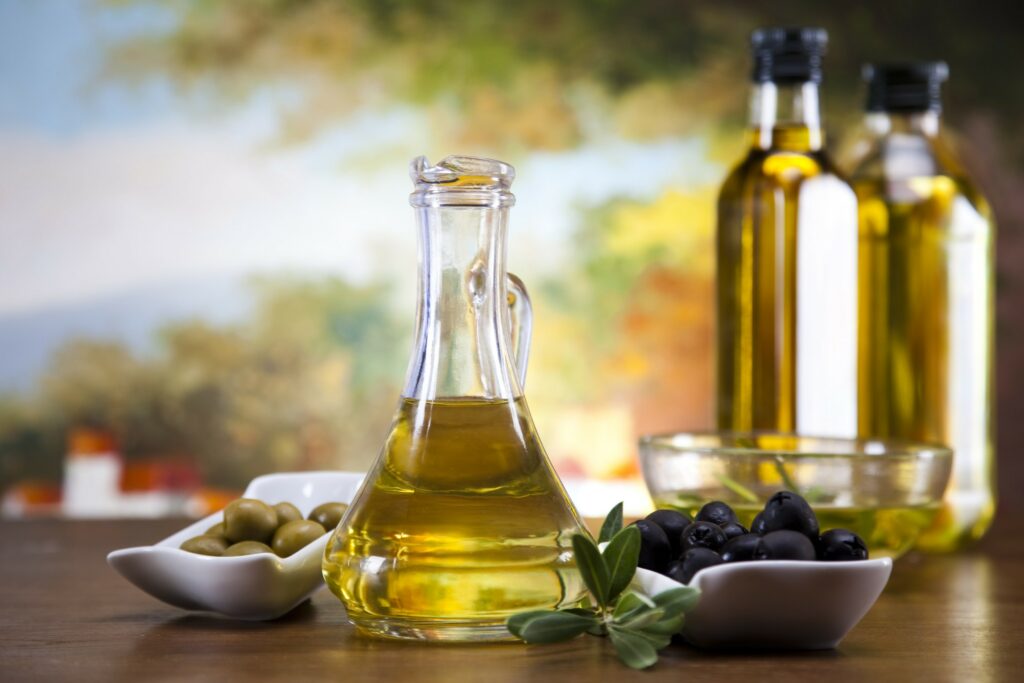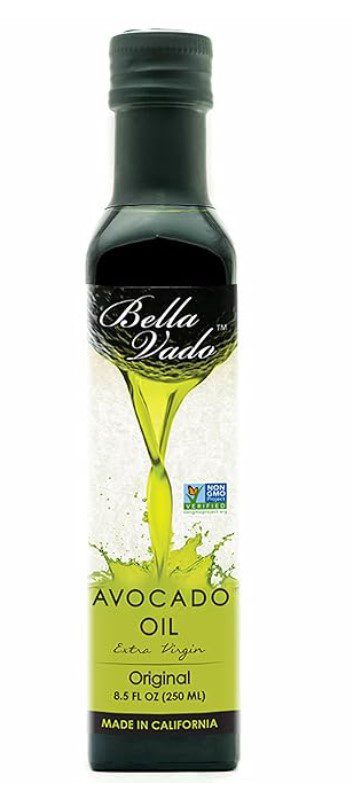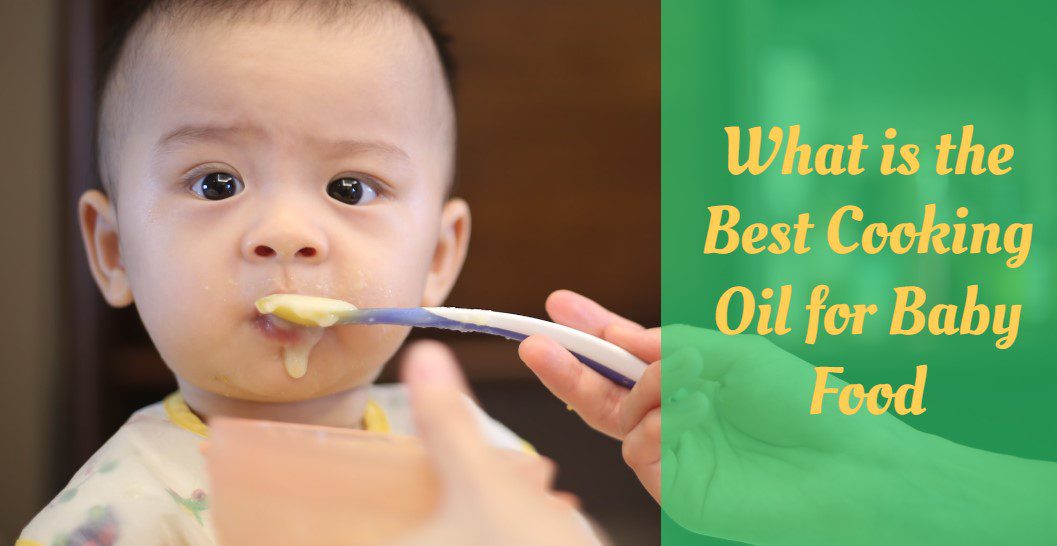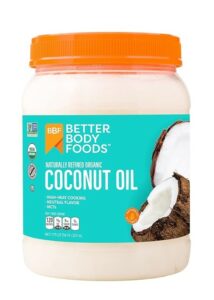As parents and caregivers, we constantly strive to provide the best for our little ones, especially when it comes to their nutrition. The transition from milk to solid foods is a significant milestone in a baby’s growth journey, and this includes the introduction of cooking oils in their diet.
The choice of cooking oil may seem trivial compared to other nutritional decisions, but it plays a crucial role in ensuring balanced and healthy development for your baby.
By the way, we have an article about the best healthy oils for deep frying that you can also check out.
However, with a myriad of options available in the market, choosing the ideal cooking oil for baby food can be overwhelming. The key lies in understanding the nutritional needs of your baby and how different oils can meet these needs. It’s not just about the type of oil, but also about the quality and the way it’s processed. The goal is to select oils that provide beneficial fats without any harmful substances.
In this article, we will delve into the world of cooking oils from the perspective of a baby’s nutritional requirements.
Introducing new foods to a baby’s diet, including cooking oils, should be a careful and informed process. It’s about finding a balance between offering essential nutrients and ensuring the food is safe and digestible for a baby.

Nutritional Needs of Babies
Understanding the nutritional requirements for infants is key for parents and caregivers. As babies transition from a liquid diet to solid foods, their nutritional needs change significantly. Among various nutrients, fats – especially certain types of fats – are crucial.
- Importance of Fats:
- Fats are a major energy source and are essential for brain and nervous system development.
- A baby’s brain undergoes rapid growth, reaching nearly 80% of its adult size by three years, necessitating a steady supply of essential fatty acids.
- Essential Fatty Acids:
- The body cannot produce essential fatty acids like omega-3 and omega-6, making their dietary inclusion critical.
- Omega-3 fatty acids (e.g., DHA) are vital for brain and eye development, influencing cognitive and visual functions.
- Omega-6 fatty acids (e.g., AA) contribute to brain function and overall growth.
- Balancing Omega-3 and Omega-6:
- A balance between omega-3 and omega-6 fatty acids is crucial to avoid issues like inflammation and to promote healthy development.
- Role in Vitamin Absorption:
- Fats aid in absorbing fat-soluble vitamins essential for infants:
- Vitamin A for vision and immune function.
- Vitamin D for bone health and immune response.
- Vitamin E as an antioxidant.
- Vitamin K for blood clotting.
- Fats aid in absorbing fat-soluble vitamins essential for infants:
In light of these facts, choosing cooking oils that provide these essential fatty acids in a safe and healthy manner is paramount. The type of fat, its source, and the method of processing, all determine the oil’s benefits for an infant’s growing body and brain.
Recommended Cooking Oils for Baby Food
Olive Oil
- Rich in Monounsaturated Fats: Olive oil is predominantly composed of monounsaturated fats, particularly oleic acid, which is known for its heart-healthy properties. This type of fat is easier to digest for babies, making it a suitable choice for their developing digestive systems.
- Loaded with Antioxidants and Vitamins: It’s not just the fats that make olive oil beneficial. It’s also rich in antioxidants and vitamins E and K, which contribute to overall health and immune function.
- Ideal for Cooking and Flavoring: Olive oil has a moderate smoke point, making it suitable for light sautéing but not for high-temperature cooking. Its unique flavor can enhance the taste of baby foods, such as pureed vegetables and meats.
You may also like: 7 Best Potato Chip Slicer Reviews
Coconut Oil
- Medium-Chain Triglycerides (MCTs): Coconut oil is unique due to its high content of MCTs, which are easily absorbed and metabolized by the body. This makes it a quick and efficient energy source, beneficial for babies’ growth.
- Lauric Acid: A significant component of coconut oil is lauric acid, which is also found in breast milk. Lauric acid is known for its antimicrobial properties, potentially supporting the immune system.
- Versatile in Baby Food Recipes: Coconut oil has a high smoke point, making it suitable for various cooking methods. Its slightly sweet taste can be a delightful addition to baby foods, from purees to small portions of cooked dishes.
Avocado Oil
- High in Healthy Fats: Avocado oil is high in monounsaturated fats, similar to olive oil, making it heart-healthy and suitable for babies. It’s also rich in omega-3 fatty acids, contributing to brain development.
- Full of Essential Nutrients: It contains nutrients vital for a baby’s growth, including vitamins E, K, and potassium.
- Cooking Flexibility: With a high smoke point, avocado oil is versatile for cooking and doesn’t impart a strong flavor, making it easy to incorporate into a variety of baby meals.
Tips for Using Cooking Oils in Baby Food
- Introduce Gradually: Start with a small amount when introducing new oils to your baby’s diet to monitor for any adverse reactions.
- Focus on Quality: Choose high-quality, cold-pressed, or virgin oils, as they undergo minimal processing, retaining most of their nutritional value.
- Avoid Overheating: Cooking oils at high temperatures can lead to the breakdown of nutrients and the formation of harmful compounds. Use oils within their smoke points to ensure safety.
- Diverse Use: Incorporate these oils in different baby foods – mix with purees, use in cooking vegetables, or add to mashed foods. This not only enhances flavor but also helps in the absorption of fat-soluble vitamins.
Oils Not Recommended for Baby Food
When preparing baby food, it’s essential to be selective about the cooking oils used. Some oils that are popular in adult diets might not be suitable for infants due to health and nutritional reasons. Here’s an overview of the types of oils that are generally not recommended for baby food and why they should be avoided.
Highly refined vegetable oils, such as soybean oil, corn oil, and sunflower oil, undergo heavy processing which often involves chemicals and high temperatures. This process can strip away nutrients and introduce harmful compounds. Additionally, these oils are typically high in omega-6 fatty acids. While omega-6s are essential, an excess can lead to inflammation and disrupt the healthy balance of omega-3 and omega-6 fatty acids in the body.
Palm oil, although widely used, is not ideal for baby food. It is high in saturated fats, which are harder for babies to digest and can contribute to an unhealthy increase in bad cholesterol levels. Moreover, the production of palm oil has significant environmental impacts, including deforestation and habitat destruction, raising ethical concerns.
Oils used for deep frying, which are often reused multiple times, are also not recommended. Repeated heating of these oils to high temperatures can lead to the formation of harmful compounds like trans fats and acrylamide, detrimental to health. Additionally, the nutritional quality of these oils degrades with each use.
Flaxseed oil, despite its high omega-3 content, is not suitable for cooking baby food. It is not stable when heated and can form harmful compounds. It’s better consumed cold in other dietary forms, rather than as a cooking oil for infants.
Best oils for babies you can buy on Amazon
Lucini, Organic Everyday Extra Virgin Olive Oil
Lucini’s Organic Everyday Extra Virgin Olive Oil, packaged in a 16.9 Fl Oz bottle, is a remarkable blend of quality, purity, and healthful benefits. This oil, derived from the first cold-press of olives, ensures the highest quality and preservation of natural flavors and nutrients.
A single serving of this oil, which is about 33 grams, contains 130 calories. This might sound substantial, but it’s important to remember that these are healthy calories, deriving from the oil’s total fat content of 14g per serving.
One of the most significant features of Lucini’s olive oil is its suitability for infants and babies. While it’s a general rule to be cautious with introducing new foods to babies, olive oil can be a safe and healthy addition to their diet. Its gentle composition, free from allergens and harmful substances, makes it ideal for baby food preparation, whether it’s in purees or as a dressing for toddler meals.
In conclusion, Lucini’s Organic Everyday Extra Virgin Olive Oil is more than just a cooking ingredient; it’s a healthful addition to your pantry.

You can also check: Is air fryer food healthy? – Detailed review
BetterBody Coconut Oil
BetterBody Foods introduces their Naturally Refined Organic Coconut Oil, a versatile and health-conscious choice for culinary enthusiasts and families alike. This 56 oz container of premium coconut oil is a testament to quality and purity, making it a perfect addition to any kitchen.
What sets this coconut oil apart is its remarkable composition, containing approximately 60% Medium Chain Triglycerides (MCTs). These MCTs are known for their energy-boosting properties, providing a natural surge of vitality to support your active lifestyle.
Notably, BetterBody Foods’ commitment to quality is evident in the certifications this product boasts. Being USDA Organic, Non-GMO, Gluten-Free, and Kosher certified, this coconut oil is a trustworthy addition to your pantry. It’s suitable even for the most sensitive of diets, including those of babies, ensuring a safe, wholesome choice for the entire family.
The coconut oil is sourced from the lush landscapes of the Philippines and Indonesia, embodying the essence of these tropical paradises. Packaged at the company’s headquarters in Utah, it represents a blend of international quality and local care, making BetterBody Foods’ Naturally Refined Organic Coconut Oil a must-have for health-conscious cooks and families.

Bella Vado Premium Avocado Oil
Introducing Bella Vado’s Premium Avocado Oil, a top-tier choice for discerning consumers. Extracted from the lush avocados grown in the family orchards of Southern California, this oil is a testament to quality and natural purity. Bella Vado takes pride in their cold pressing technique, ensuring that the oil retains its rich nutrients and robust flavor. This extra virgin avocado oil is a culinary delight, devoid of any additives or preservatives, reflecting the brand’s commitment to 100% natural products.
What sets this oil apart is its remarkable suitability for babies. Its gentle and nourishing properties make it an ideal addition to a baby’s diet or skincare routine. Each 250ml bottle, which conveniently ships from California, encapsulates the essence of 15-20 avocados. This makes it not just a luxurious choice for your kitchen but also a wholesome, nutrient-rich option for your little one’s delicate needs. Whether used in cooking or as a mild moisturizer, Bella Vado’s avocado oil is a versatile product that harmonizes health, taste, and quality.

You may also like: 7 Best Grill Brands Made in the USA (And Their Best Offer)
In conclusion, selecting the appropriate cooking oil is a vital aspect of preparing nutritious and safe baby food. Oils like olive, coconut, and avocado provide essential fatty acids and nutrients beneficial for a baby’s growth and development, while others like highly refined vegetable oils, palm oil, and reused deep-frying oils should be avoided due to health and nutritional concerns.
Remember, every baby is unique, and consulting with a pediatrician or nutritionist is always recommended to ensure the dietary choices align with your baby’s specific health needs and developmental stage.

